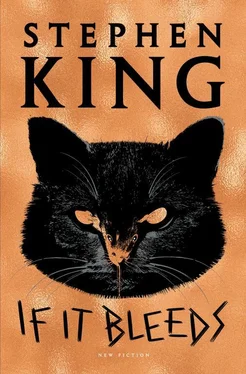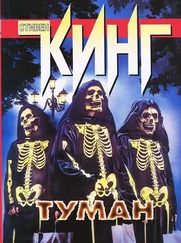No, it wasn’t enough.
I went home that afternoon and dug through the drawers of the bureau in my room, not quite admitting to myself what I was looking for… or why. What I was looking for wasn’t there, which was both a disappointment and a relief. I started to leave, then went back and stood on tiptoe to explore the top shelf in my closet, where junk had a way of accumulating. I found an old alarm clock, an iPod that had busted when I dropped it in the driveway while skateboarding, a tangle of earphones and earbuds. There was a box of baseball cards and a stack of Spider-Man comic books. At the very back, there was a Red Sox sweatshirt much too small for the body I now inhabited. I lifted it and there, underneath, was the iPhone my father had given me for Christmas. Back in my shrimpsqueak days. The charger was there, too. I plugged the old phone in, still not quite admitting what I was up to, but when I think of that day now—not so many years ago—I believe that the motivating force was something Ms. Hargensen had said to me while we were cleaning the chem lab sinks: A person shouldn’t call out unless they want an answer . That day I wanted one.
It probably won’t even take a charge , I told myself. Been up there gathering dust for years . But it did. When I picked it up that night, after Dad had turned in, I saw a full battery icon in the upper righthand corner.
Man, talk about your trips down Memory Lane. I saw emails from long ago, photos of my dad from before his hair started to go gray, and IMs back and forth between me and Billy Bogan. No news in them really, just jokes, and illuminating information like I just farted, and incisive questions like Did you do your algebra. We’d been like a couple of kids with Del Monte cans connected by a length of waxed string. Which is what most of our modern communications amount to, when you stop to think of it; chatter for the sake of chatter.
I took the phone to bed with me just as I had back before I needed to shave and when kissing Regina was a huge deal. Only now the bed which had once seemed big seemed almost too small. I looked across the room at the poster of Katy Perry I had put up when she had seemed, to junior high school me, the epitome of sexy fun. I was older than that shrimpsqueak kid now, and I was just the same. Funny how that works.
If ghosts exist , Ms. Hargensen had said, I’ll bet not all of them are holy .
Thinking of that almost made me stop. Then, once more thinking of that irresponsible asshole playing tennis in his rehab, I went ahead and called Mr. Harrigan’s number. It’s okay , I told myself. Nothing will happen. Nothing can happen. This is just a way of clearing your mental decks so you can leave the anger and sorrow behind and move on to the next thing .
Except part of me knew something would happen, so I wasn’t surprised when I got a ring instead of silence. Nor was I when his rusty voice spoke in my ear, originating from the telephone I’d put in his dead man’s pocket almost seven years before: “I’m not answering my phone now. I will call you back if it seems appropriate.”
“Hello, Mr. Harrigan, it’s Craig.” My voice was remarkably steady, considering that I was talking to a corpse and the corpse might actually be listening. “There’s a man named Dean Whitmore who killed my favorite teacher from high school and her husband. The guy was drunk and hit them with his car. They were good people, she helped me when I needed help, and he didn’t get what he deserved. I guess that’s all.”
Except it wasn’t. I had at least thirty seconds or so to leave a message, and I hadn’t used them all. So I said the rest of it, the truth of it, my voice dropping lower still, so it was almost a growl: “I wish he was dead.”
• • •
These days I work for the Times Union , a newspaper that serves Albany and the surrounding area. The salary is peanuts, I could probably make more writing for BuzzFeed or TMZ, but I have that trust fund as a cushion, and I like working for an actual paper, even though most of the action these days is online. Call me old-fashioned.
I made friends with Frank Jefferson, the paper’s go-to IT guy, and one night over beer at the Madison Pour House, I told him I’d once been able to connect with the voicemail of a guy who was dead… but only if I called from the old phone I’d had when the guy was still alive. I asked Frank if he’d ever heard of anything like that.
“No,” he said, “but it could happen.”
“How?”
“No idea, but there were all sorts of weird glitches with the early computers and cell phones. Some of them are legendary.”
“iPhones, too?”
“Especially them,” he said, swigging his beer. “Because they were rushed into production. Steve Jobs never would have admitted it, but the Apple guys were scared to death that in another couple of years, maybe only one, BlackBerry would achieve total market dominance. Those first iPhones, some of them locked up every time you typed the letter l . You could send an email and then surf the web, but if you tried to surf the web and then send an email, your phone sometimes crashed.”
“That actually happened to me once or twice,” I said. “I had to reboot.”
“Yeah. There was all kinds of stuff like that. Your thing? I’d guess the guy’s message somehow got stuck in the software, same way you can get a piece of gristle stuck between your teeth. Call it the ghost in the machine.”
“Yes,” I said, “but not a holy one.”
“Huh?”
“Nothing,” I said.
• • •
Dean Whitmore died on his second day in the Raven Mountain Treatment Center, a luxury spin-dry facility in upstate New Hampshire (there were indeed tennis courts; also shuffleboard and a swimming pool). I knew almost as soon as it happened, because I had a Google Alert on his name, both on my laptop and my Weekly Enterprise computer. No cause of death was given—money talks, you know—so I took a little trip to the neighboring New Hampshire town of Maidstone. There I put on my reporter’s hat, asked a few questions, and parted with some of Mr. Harrigan’s money.
It didn’t take long, because, as suicides went, Whitmore’s was more than a bit out of the ordinary. Kind of like strangling to death while beating off is out of the ordinary, you could say. At Raven Mountain the inpatients were called guests instead of dopers and alkies, and each guest room had its own shower. Dean Whitmore went into his before breakfast and chugged down some shampoo. Not to commit suicide, it seemed, but to grease the runway. He then broke a bar of soap in two, dropped half on the floor, and crammed the other half down his throat.
I got most of this from one of the counselors, whose job at Raven Mountain was to work at breaking drunks and druggies of their bad habits. This fellow, Randy Squires by name, sat in my Toyota drinking from the neck of a Wild Turkey bottle purchased with some of the fifty dollars I’d given him (and yes, the irony was not lost on me). I asked if Whitmore had perhaps left a suicide note.
“He did,” Squires said. “Kind of sweet, actually. Almost a prayer. ‘Keep giving all the love you can,’ it said.”
My arms broke out in gooseflesh, but my sleeves covered that, and I was able to manage a smile. I could have told him that wasn’t a prayer, but a line from “Stand By Your Man,” by Tammy Wynette. Squires wouldn’t have gotten it, anyway, and there was no reason why I’d want him to. It was between Mr. Harrigan and me.
• • •
I spent three days on that little investigation. When I got back, Dad asked me if I’d enjoyed my mini-vacation. I said I had. He asked me if I was ready to go back to school in a couple of weeks. I said I was. He looked me over carefully and asked if anything was wrong. I said there wasn’t, not knowing if that was a lie or not.
Читать дальше








